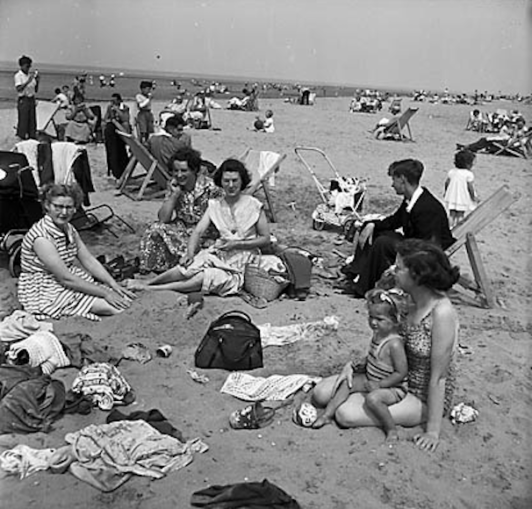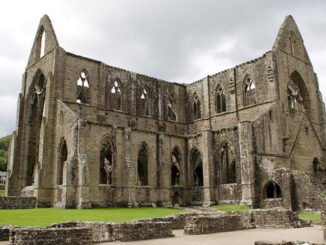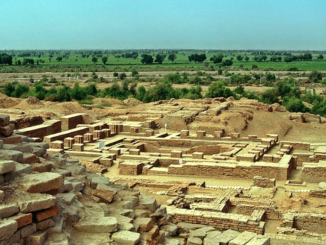In 1954, the Manchester Evening News launched a “Special Investigation” and tasked my uncle, John Alldridge, with answering the question –
Holidaymakers, do you get value for your MONEY?
What follows is his report on Rhyl. Jerry F
Rhyl: “Our Business Depends on Making You Happy”
The brightly coloured cover of Rhyl’s official town guide shows a bunch of happy youngsters building a sandcastle.
There is something very appropriate about this. For Rhyl is one of those smaller resorts which cater essentially for the family holiday. For three weeks in the year, its normal population of 19,000 expands to somewhere around 60,000. Of this surplus 40,000 about one-third must be children.

Beatrice Street Church, Oswestry, Sunday School trip to Rhyl,
Geoff Charles – Licence CC BY-SA 2.0
Now in theory at any rate, the ideal holiday is the family holiday by the sea. But this kind of holiday demands a number of essentials: good weather, a clean dry beach, a variety of juvenile entertainment, understanding sympathetic landladies to whom children are not just a necessary evil.
And so with a very definite target in view, Rhyl settles down confidently to cater for a homely working-class family holiday – a family holiday which, you quickly discover, has the accent very much on youth.
Cots, high-chairs
The average daily rate for board residence in Rhyl is somewhere between 15s. and 17s. Special terms for children scale down as low as 7s. 6d.
One typical advertisement out of the three or four hundred listed in the town guide offers a babysitting service, cots and high-chairs, special rates for children, for parties of young people, for honeymooners.
Here, too, evening shows start around seven o’clock, finishing just after nine, so that when the children have been safely tucked up in bed mother and father ran still have an hour to themselves.
Entertainment generally in Rhyl is aimed deliberately at youth. Here the old-time open-air concert party and Punch and Judy are as popular as ever.
Round the bandstand “audience participation” – which encourages youngsters to take part in the show – is the rule. They can ride miniature trams, trains, motorboats all day long. (A tough generation, this – despite the appalling weather last month Rhyl’s Promenade boating pool actually took more money than it did last year). And there must be more rock and ice cream sold to the square yard in Rhyl than anywhere else in the North-West – with the possible exception of Blackpool.
Damp patches . . .
Now this is a very fine beginning. And given good weather there should be few complaints. Unfortunately, when the weather is bad the flaws still show like damp patches in a leaky tent.
Rhyl is flanked on both sides by colonies of caravans and makeshift bivouacs of all kinds. These, too, depend on Rhyl for their entertainment and diversion. At peak weekends they add another 10,000 to the towns ever-shifting population. On a wet morning, with cafes full to overflowing, with cinemas and theatres closed, a sullen mass of holidaymakers surges aimlessly up and down the two or three main streets.
Hard as this must be on the adults, it is harder still on the children.
The simple answer would be children’s playgrounds, undercover and properly supervised, where youngsters could be “parked” in perfect safety while their parents go off in search of more adult amusement.
A new feature in holiday accommodation is the holiday flatlet. Rhyl has plenty of examples to offer.
In theory the holiday flatlet is the old “furnished apartments” – now almost obsolete – plus all the advantages and none of the disadvantages of the caravan. What it usually amounts to, in practice, is a bed-sitting room, a sink, and a gas stove. The average rent of such a flatlet in Rhyl would be from £7 to £8 a week.
Local authorities, I feel, view this new fashion with misgivings. Since such accommodation offers freedom to come and go at will they are much sought after by holiday folk tired of the lights-out-at-eleven restrictions of the average boarding-house.
In their eagerness to acquire a temporary front-door key they are unwittingly making things easy for the racketeers to whom holidaymakers are always fair game.
Some of these holiday flatlets are very good indeed. They are well furnished, have their own electricity for cooking and heating, and guarantee a supply of really hot water.
But too many fall far below the standard of the worst of the old-time “furnished digs”.
Because it offers the working-class family exactly the sort of holiday it knows they want Rhyl is bursting at the seams for lack of accommodation. There is a move afoot for boarding-house proprietors whose premises adjoin to link up and so, in effect, turn four small boarding-houses into one large private hotel.
Logical – and, no doubt, economical – though this may be, I hope for Rhyl’s sake that nothing comes of it. For Rhyl, like so many of these smaller resorts, has made a solid reputation out of those very personal, homely attentions which only the small hotel or boarding-house can offer its guests.
Not being as yet a borough, Rhyl has no motto. When the time comes for that I suggest it cannot improve on the one already in use at “Shang-Re-Lar” in Butterton Road – “Our Business Depends on Making You Happy”.
Credits:
Text:
The British Newspaper Archive (www.britishnewspaperarchive.co.uk
The British Library Board
© Reach PLC
© Jerry F



